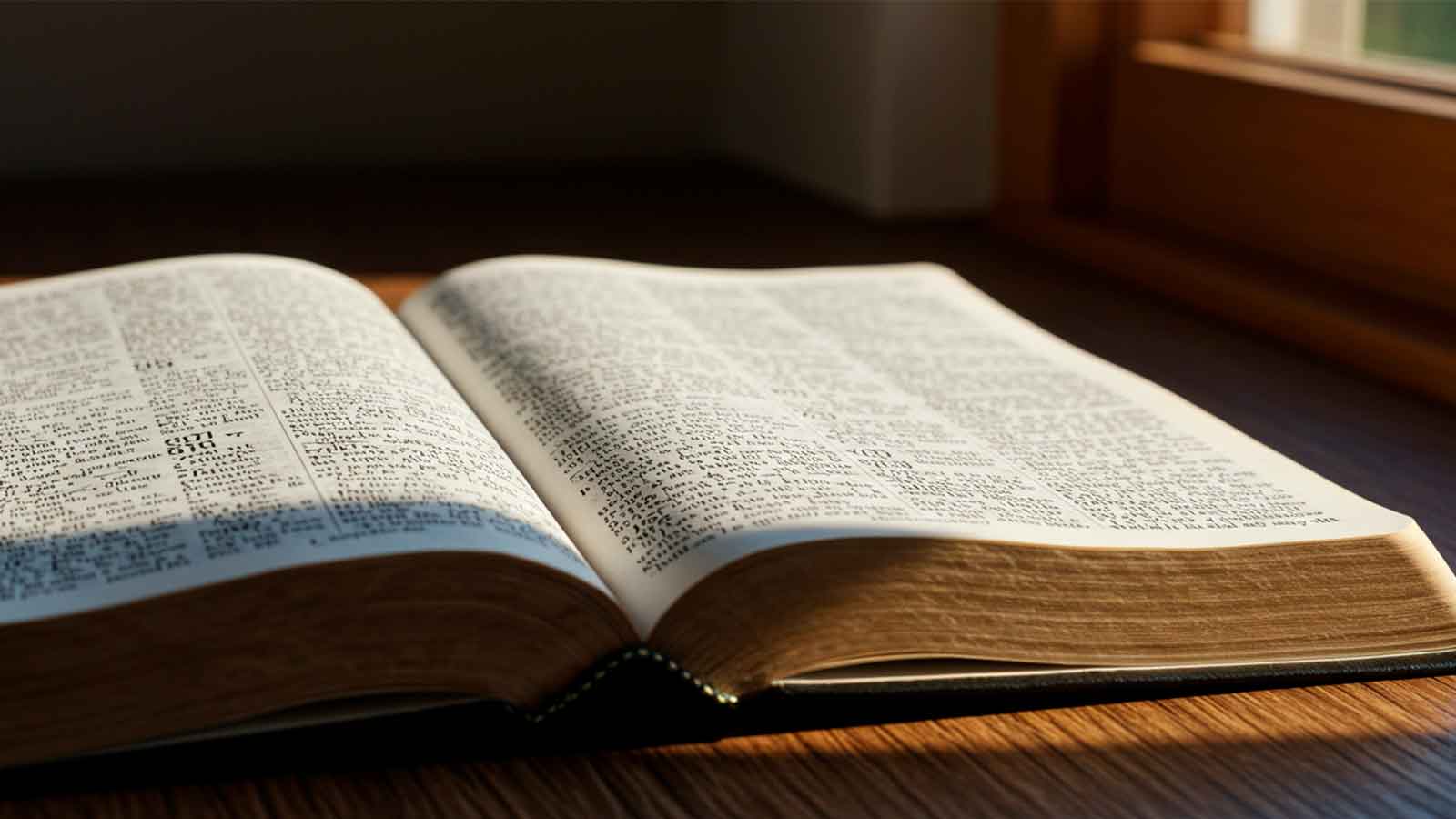Psalm 82 is one of the most intriguing texts in the Book of Psalms. It presents us with a powerful scene in which God stands as judge among human leaders and “gods,” demanding responsibility and justice.
In this article, we will explore Psalm 82 in depth, highlighting its teachings, historical context, spiritual messages, and how to apply it in everyday life. Get ready to dive into a rich reading full of insights.
Psalm 82 – Complete
¹ God stands in the congregation of the mighty; He judges among the gods.
² How long will you judge unjustly and show partiality to the wicked? (Selah.)
³ Defend the poor and fatherless; do justice to the afflicted and needy.
⁴ Deliver the poor and needy; free them from the hand of the wicked.
⁵ They do not know, nor do they understand; they walk about in darkness; all the foundations of the earth are shaken.
⁶ I said, “You are gods, and all of you are children of the Most High.”
⁷ But you shall die like men and fall like one of the princes.
⁸ Arise, O God, judge the earth, for You possess all nations.

Psalm 82 Explained – Verse by Verse
Psalm 82:1
God stands in the congregation of the mighty; He judges among the gods.
In this verse, we see a powerful symbolic scene: God appears among leaders and authorities (here called “gods”) to exercise judgment. This image shows that, despite the power these leaders hold, there is a supreme judge above them. God watches and evaluates their actions.
Psalm 82:2
How long will you judge unjustly and show partiality to the wicked? (Selah.)
Here, God directly questions the unjust leaders, asking how long they will continue to favor the wicked over the righteous. “Selah” suggests a pause for reflection, calling everyone to consider the seriousness of injustice.
Psalm 82:3
Defend the poor and fatherless; do justice to the afflicted and needy.
God gives a clear command: leaders must protect society’s vulnerable, such as the poor and orphans. They have the duty to ensure justice for the afflicted and needy, neither ignoring their pain nor exploiting their weakness.
Psalm 82:4
Deliver the poor and needy; free them from the hand of the wicked.
Beyond doing justice, leaders are called to act actively, freeing the needy from the hands of their oppressors. It is not enough to be just in theory; one must intervene and help those being harmed.
Psalm 82:5
They do not know, nor do they understand; they walk about in darkness; all the foundations of the earth are shaken.
This verse describes the ignorance of unjust leaders. They walk without understanding, immersed in the darkness of injustice. As a result, the “foundations of the earth” — that is, the pillars that sustain social order — begin to shake and collapse.
Psalm 82:6
I said, “You are gods, and all of you are children of the Most High.”
Here, God reminds them that He called these leaders “gods” because of the authority granted to them. They are children of the Most High in the sense that they were chosen to govern under divine principles. However, this neither makes them immortal nor exempts them from responsibility.
Psalm 82:7
But you shall die like men and fall like one of the princes.
Despite their authority, unjust leaders will die like any ordinary person. They are neither untouchable nor immortal. God reminds them that, like other princes and kings, they are subject to death and divine judgment.
Psalm 82:8
Arise, O God, judge the earth, for You possess all nations.
The psalm ends with a plea for God to intervene and judge the earth. He is the true owner of all nations, and His justice alone can restore order and bring balance to the world.
What Is Psalm 82?
Psalm 82 is a psalm attributed to Asaph, one of the main temple musicians in King David’s time. This psalm highlights God as the supreme judge and denounces the corruption and injustice practiced by human leaders. It is a strong call for the powerful to act righteously and defend the most vulnerable.
In its opening verses, Psalm 82 presents God standing in the divine assembly, calling to account those who should practice justice. This setting prompts important reflections on power, morality, and accountability.
Historical Context of Psalm 82
Psalm 82 was written at a time when Israel’s neighboring nations were marked by oppressive and unjust systems of government. Within Israel, leaders also failed to fulfill their roles justly. The text of Psalm 82 strongly criticizes these rulers and emphasizes that, although they are called “gods” because of their power, they are mortal and will be judged by God.
Understanding this context helps us realize that Psalm 82 is not just a social critique but also a spiritual reminder that no one is above divine justice.

Structure and Message of Psalm 82
Psalm 82 can be divided into three main parts:
Call to Judgment
At the beginning, we see God standing among the assembly, ready to judge the unjust leaders. He asks how long they will continue to act with partiality and benefit the wicked. This call is an impactful introduction that immediately places everyone before the responsibility to act correctly.
Command to Defend the Vulnerable
In the middle of Psalm 82, God gives a direct order: “Defend the weak and the fatherless; do justice to the poor and the needy; rescue the oppressed from the hands of the wicked.” This section is the moral heart of the psalm, clearly showing what is expected of leaders.
Warning and Sentence
The end of Psalm 82 is a warning: even though these leaders are called “gods,” they are mortal and will fall like any common man. God closes the psalm with a request for Himself to judge the earth, for all nations belong to Him.
The Spiritual Meaning of Psalm 82
Power and Responsibility Go Hand in Hand
Psalm 82 teaches us that power and authority come with great responsibility. This applies not only to political or religious leaders but to all of us. Whenever we have influence — at home, at work, in the community, or on social media — we are called to use it with wisdom and responsibility. God watches how we handle the power entrusted to us.
No One Is Above Divine Judgment
Another central point is that no position of power places us above God’s judgment. The psalm reminds us that, no matter how admired or respected we are by others, we are all ultimately human and will answer for our actions. This is a message against arrogance and pride, reminding us that humility is essential for anyone in leadership.
True Justice Goes Beyond Laws
In Psalm 82, we see that true justice is not just about applying rules or maintaining a social façade. True justice is compassionate, centered on caring for the vulnerable: the poor, the orphans, the needy, and the marginalized. This vision challenges each of us to assess whether we are living merely to keep up appearances or actually acting with love and empathy.
Spiritual Ignorance Shakes Society
The psalm also speaks of the darkness of moral and spiritual ignorance. When those in power do not understand their role, the whole society suffers. This applies to leaders but also to ordinary citizens. Every choice we make impacts others, and it is our duty to seek understanding and light in all our decisions.
A Call to Action, Not Just Reflection
Psalm 82 does not want us merely to notice the injustice around us; it calls us to act. God invites us to be active participants in transforming the world. This does not mean we must perform grand heroic acts; often, small gestures — helping someone in need, defending someone treated unfairly, acting honestly — make all the difference.
Hope in God’s Final Justice
Finally, the psalm ends with a plea for God to judge the earth. This reminds us that, even when injustice seems too great for us, God is the true Lord of the nations and will bring complete justice at the right time. It is an invitation to hope, trust, and perseverance, even in difficult times.
Practical Applications of Psalm 82
Everyday Justice
Psalm 82 challenges us to practice justice not only in positions of power but also in our small daily decisions. We are called not to close our eyes to the injustice around us.
Collective Responsibility
This psalm reminds us that responsibility for justice is not only individual but collective. As a community, we must care for the weakest and fight for fairer conditions for everyone.
Personal Reflection
When reading Psalm 82, we can ask ourselves: Are we being just in our actions? Are we looking at others with compassion or only seeking our own benefit?
Interesting Facts About Psalm 82
- Psalm 82 is frequently cited in theological debates about the nature of human authority.
- Some scholars interpret the reference to “gods” as a direct critique of human judges who behaved as if they were untouchable.
- This psalm is used in some liturgical traditions as a cry for social justice.
Final Reflection on Psalm
Psalm invites us to reflect on how we use our power and influence, whether in major decisions or small actions. It reminds us that true justice lies in caring for the most vulnerable and that, in the end, we will all give an account to God.
This message remains extremely relevant, especially in times of social inequality and injustice. Reading and meditating on Psalm 82 can strengthen us spiritually and inspire us to be agents of change in our environment.
FAQ About Psalm 82
What does the term “gods” mean in Psalm 82?
In the context of Psalm 82, the term “gods” refers to human judges and leaders who received authority but abused that power.
Why is Psalm 82 relevant today?
Psalm 82 is relevant because it speaks about justice, responsibility, and accountability — themes that remain present in our society.
How can I apply Psalm 82 in practical life?
You can apply Psalm 82 by seeking justice in your daily actions, defending the needy, and acting with integrity in every area of your life.
What is the main spiritual message of Psalm 82?
The main spiritual message of Psalm 82 is that God observes and judges all human actions and that we are called to be just and compassionate.
Is there a connection between Psalm 82 and the New Testament?
Yes, Jesus quotes Psalm 82 in John 10:34, showing how He Himself understood and reinterpreted this text in His ministry.
READ ALSO:
- Psalm 76: Deep Reflections and Meanings
- Psalm 75: Recognizing Divine Justice and God’s Power
- Psalm 74: Reflections on Divine Presence in Times of Crisis
FOLLOW US ON FACEBOOK
I hope you enjoyed it